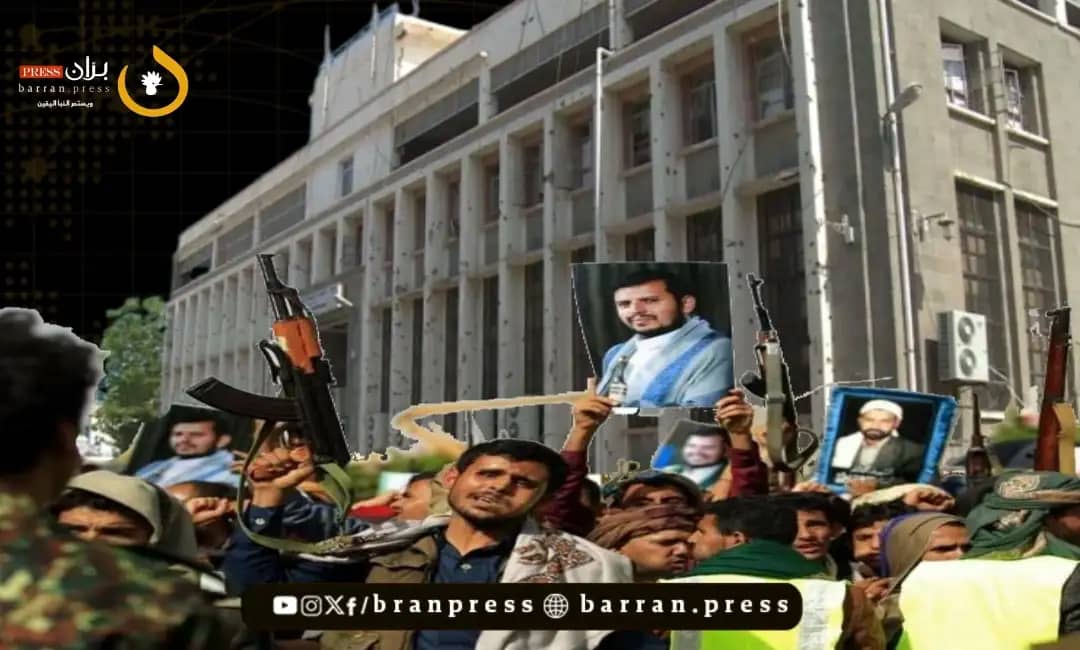


Barran Press
A recent research paper by the "Mocha Center for Strategic Studies" seen by Barran Press, has outlined five potential scenarios for the ongoing economic escalation between the internationally recognized Yemeni government and the Houthi group, designated as a terrorist organization. The study, reviewed by "Bran Press," delves into the decisions made by the Yemeni Central Bank, the Houthi's decrees, and the factors driving the economic and financial escalation.
The study identifies the Houthi's decision to mint a new 100 Yemeni riyal coin as the "spark" igniting the latest escalation. This move, following the resolution of the unified network issue that had led to bank closures, triggered a decisive response from the Central Bank in Aden. The bank announced the relocation of banks and the replacement of old banknotes.
The study explores two key aspects of the consequences of these decisions and the expected escalation scenarios: the withdrawal of currency and the relocation of bank management.
Scenario 1: Currency Withdrawal
The study suggests the Central Bank may issue a decree invalidating banknotes issued before 2016, after a two-month grace period. This would prevent their circulation and storage by financial institutions and individuals. While this decision wouldn't eliminate the currency in Houthi-controlled areas, the study predicts a worsening liquidity crisis, particularly if restrictions on foreign remittances to Houthi-controlled regions are tightened.
The study anticipates that individuals, businesses, and even money changers and banks will seek to dispose of their old currency, despite significant damage to some of it. This is a precautionary measure and a shift towards gold, foreign currencies, and non-monetary assets. This could initially increase liquidity but negatively impact the exchange rate.
Although Houthi's attempt to address the liquidity crisis with the new coin failed, the study suggests that the worsening crisis could push them to take similar measures for different denominations. This is because minting currency provides the Houthis with an easy and additional source of income.
Scenario 2: Relocation of Bank Management
The study highlights that the conflicting decisions from the Central Bank and Houthi authorities will lead to a near-complete separation of banks.
The study presents five potential scenarios for the outcome of this escalation:
Scenario 1: Status Quo
This scenario involves banks remaining unable to relocate to Aden, potentially leading to isolation and stricter sanctions. The study deems this scenario unlikely unless it's part of a new negotiated settlement. However, even a comprehensive settlement wouldn't guarantee a perfect return to normalcy, especially with the Houthis retaining military control. However, it could provide common ground and acceptable points based on existing frameworks.
Scenario 2: Separation of Bank Management
This scenario envisions the separation of bank management and oversight systems, with the possibility of maintaining a single, formal institution. The Central Bank would require access to data on joint bank operations in Houthi-controlled areas.
This scenario could lead to the isolation of banks in Sana'a, restricting their activities and interactions with the outside world to the main or regional branches in Aden. The study predicts technical, accounting, and administrative challenges for banks as a result of this step. It represents a realistic consequence of the opposing policies, with the potential for the Houthis to impose sanctions on banks implementing this move. However, they would be unable to find alternatives for the banks' dealings with the outside world.
This scenario could transform the banking system in Houthi-controlled areas into a system resembling the isolated Iranian banking system.
Scenario 3: Limited Coordination
This scenario involves the establishment of a limited coordination mechanism between the Central Bank and its branch in Sana'a to oversee banks, aiming to address concerns about data oversight and anti-terrorism financing.
The study dismisses this scenario for several reasons: the Houthis are designated as a terrorist group domestically and regionally, and their participation in bank and financial oversight is unacceptable. Additionally, any agreement on this matter without a comprehensive settlement and a resolution to the legal status of the Sana'a branch is untenable. This scenario could lead to the resignation of the current Central Bank board.
Scenario 4: Relocation of Bank Headquarters
This scenario involves relocating bank headquarters and operations to Aden. The study highlights the significant challenge of confronting the Houthis, who could seize bank assets and property or target bank staff and restrict their movements.
Scenario 5: Continued Escalation
This scenario involves sustained escalation in the economic sphere, particularly in the financial sector, telecommunications, and import mechanisms. This could lead to the collapse of the current ceasefire and a return to military conflict.
The study currently deems this option unlikely in the short term but possible in the medium term, especially if negotiations between Saudi Arabia and the Houthis fail.
The study concludes by emphasizing the potential for the economic escalation to have a significant impact on the Yemeni people, particularly those in Houthi-controlled areas. It highlights the need for a negotiated solution to the conflict to prevent further deterioration of the economic situation.